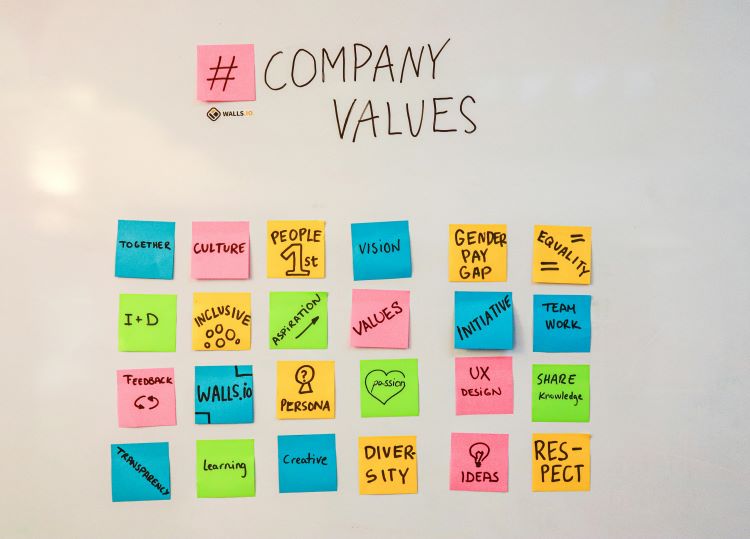
Values awareness in the workplace serves as a powerful tool for personal and professional development, influencing motivation, decision-making, resilience, communication, and overall satisfaction in life.
What are values? Here are two definitions, one dictionary, one academic: “Principles or standards of behaviour; one’s judgement of what is important in life” or “A deeply internalised philosophical code that serves as a personal guide for goal setting, decision-making, conflict resolution, and more generally how one lives one’s life.”
It might be argued that the definition in the dictionary is incorrect. This is because our values do not necessarily adhere to morals or principles, rather they are unique to each individual.
Examples of values
It is important to note certain activities that will honour values. These may include learning/growth, freedom/independence, fun/humour/play. Money, for example, is not a value, although money can lead to enabling your values, such as having the freedom and independence to conduct life choice activities.
Does your organisation know it’s core values?
Your organisation may already have a set of values. The question is: how well do employees within the organisation know they exist and are they adhered to? Company values need to be real so that employees are living and breathing the values in their day to day work.
The role of HR in promoting organisational values
Discussing values with team members is a crucial aspect of fostering cohesion, alignment, and a shared sense of purpose within an organisation. HR can play a key role in promoting organisational values. Here are some key steps and considerations for having meaningful discussions about values, which can be conducted through internal workshops. It is important that HR obtains buy in from the CEO and board members and that they actively play a part in any values programme.
Tips when conducting a values programme
Create a Safe and Open Environment: Begin by establishing a safe and open atmosphere where team members feel comfortable expressing their thoughts and perspectives without fear of judgment or repercussion.
Define and Clarify Values: Start by defining what values are and why they are important for the team. Values are the guiding principles that dictate behaviours, decisions, and interactions within the team. Make sure everyone understands the values being discussed.
Identify Core Values: Encourage team members to identify and articulate their individual core values. This could involve reflecting on personal beliefs, experiences, and priorities. These can range from integrity and collaboration to innovation and diversity.
Discuss Alignment: Facilitate a discussion on how individual values align with the team’s overall goals and objectives. Identify common values and areas of divergence. Discussing alignment helps ensure that everyone is moving in the same direction.
Seek Consensus: Work towards achieving consensus on the core values that the team collectively holds dear. This may involve compromise and negotiation but is essential for establishing a unified framework for decision-making and behaviour.
Explore Examples: Use real-life examples or scenarios to illustrate how values manifest in actions and decisions within the team context. This can help team members better understand the practical implications of their shared values.
Encourage Reflection: Encourage team members to reflect on how their own behaviours and actions align with the agreed-upon values. Regular reflection helps reinforce the importance of values and promotes accountability within the team.
Integrate Values into Team Culture: Once core values have been identified, integrate them into the team’s culture and day-to-day operations. This could involve incorporating values into performance evaluations, recognition programs, and team rituals.
Revisit and Revise: Periodically revisit and reassess the team’s values to ensure they remain relevant and meaningful. As the team evolves and faces new challenges, values may need to be revised or expanded to accommodate changing circumstances.
By engaging in open, honest, and reflective discussions about values, teams can strengthen their cohesion, effectiveness, and resilience in pursuit of shared goals.
Aligning Work and Life Values = Fulfilment
The values of an organisation can play a significant role in a person’s life, as in the main they would seek to work for a company that aligns with their own sense of career purpose. Examples of this would include the following:
Integrity
Work: Upholding honesty and ethical behaviour in all business dealings, maintaining transparency with stakeholders.
Life: Living truthfully, being authentic, and acting in alignment with personal principles.
Teamwork
Work: Collaborating effectively with colleagues, fostering a supportive team culture, and recognizing the contributions of others.
Life: Working well with others, building strong relationships, and understanding the value of cooperation.
In summation, values awareness in the workplace serves as a powerful tool for personal and professional development, influencing motivation, decision-making, resilience, communication, and overall satisfaction in life. It also makes business sense as employees who work for an organisation that truly promotes its values are likely to reciprocate with loyalty, commitment and motivation.
Bernie O’Keeffe is an experienced and qualified coaching professional who specialises in supporting young talent on their career journey. Bernie specialises in the support services sector, rail, retail, waste management and charities
Read more blogs from Bernie: Are we truly listening?

+ 3 more
A career coach specialising in guiding young talent within organisations